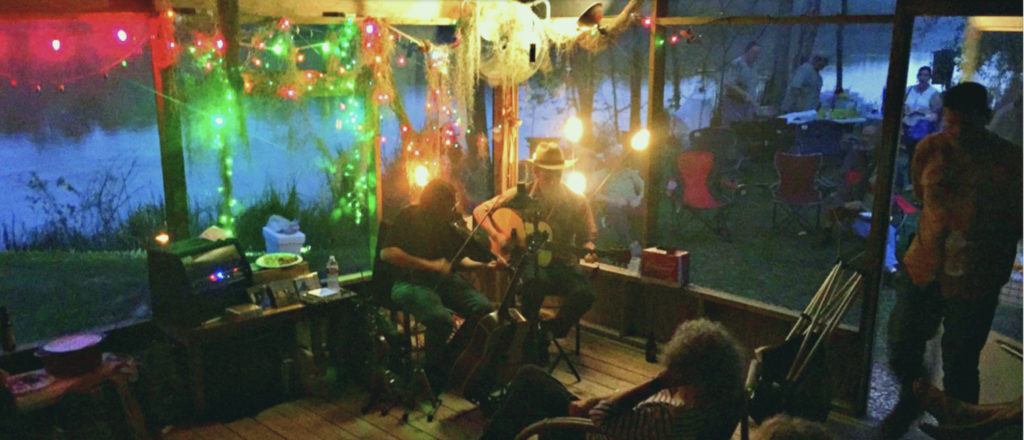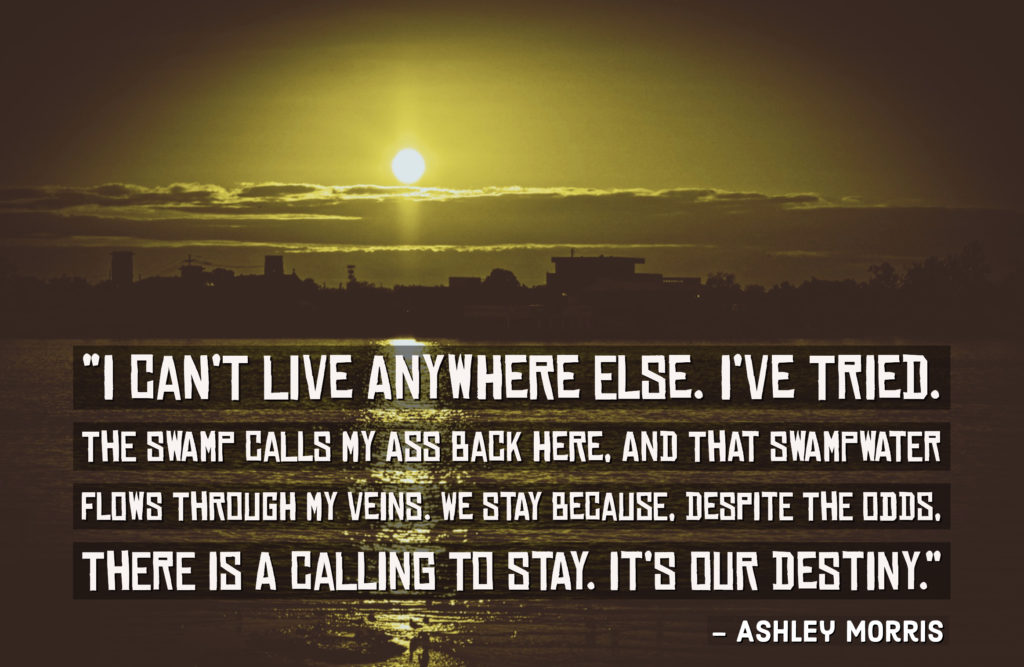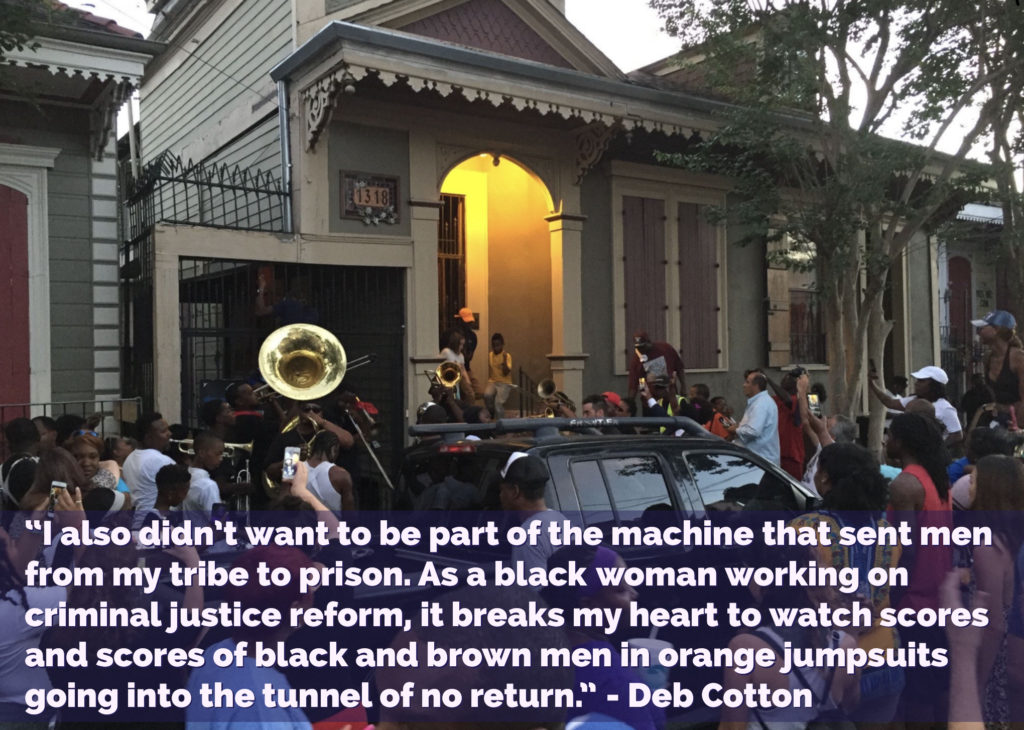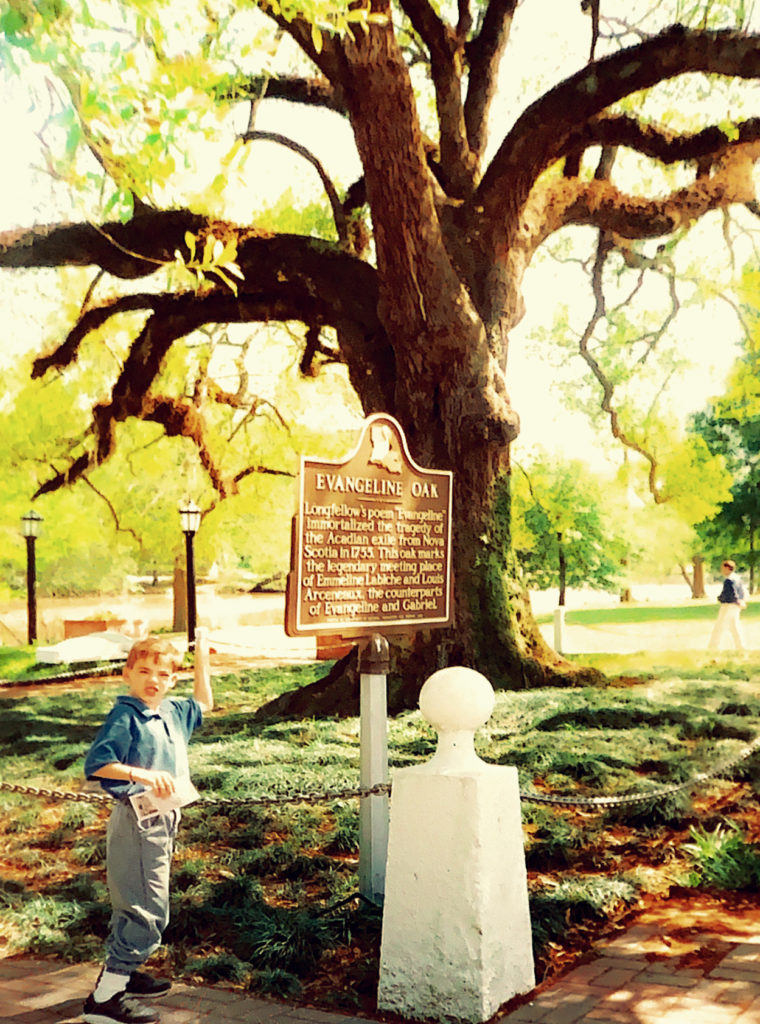The Grammy award-winning band Lost Bayou Ramblers of Broussard and Arnaudville perform at Tipitina’s in New Orleans. Photo credit: Lamar White, Jr.
Prologue:
Two weeks ago, as Cayman Clevenger, the Bayou Brief’s Chairman of the Board, informed our readers, Gambit named me as one of their Top 40 under 40 of 2019. (The Top 40 were not ranked, but I imagine if it had been, there would be universal agreement: The #1 seed should belong to the only teenager who made the cut: 19-year-old Philip Youmans, a film director whose debut movie “Burning Cane” just won the top prize at the Tribeca Film Festival). While I’d mentioned the recognition on my social media, I hadn’t intended to be too self-aggrandizing on the Bayou Brief.

But considering Cayman has helped build this publication behind-the-scenes more than anyone else (and despite the fact that the only warning I’d received he was up to something was a text message he sent asking, “Are you okay with surprises?”), I am thankful for the opportunity to publicly express my gratitude for his invaluable support (he came up with the name “Bayou Brief”), his belief in the importance of this work (even though he does not always share the same political perspective), and his loyal friendship. He has never taken a penny for his work, and he has never once asked for public recognition. Thank you, Cayman. Oh dang it, I forgot to ask: Are you okay with surprises?
He also provided me with the opportunity to express something here that I’d previously mentioned on Twitter: There are two extraordinary couples who have inspired me more than anyone else to pursue a career in publishing: Clancy DuBos and his wife Margot (though I don’t know her as well as I know Clancy) of Gambit and Cherry Fisher May and her husband Steve, who spent their careers promoting a better, more inclusive, and more accountable politics in Acadiana.
(Although Gambit is now owned by John Georges, it seems to have been spared, thus far, from the influence of editor Peter Kovacs, but that’s another story).
In his report about Gambit’s recognition of my work and the work of 39 others here in New Orleans, Cayman linked to a five-year-old column, “In Defense of Louisiana’s Magic,” I wrote for my former website, CenLamar. I hadn’t read the column since publishing it, so I was slightly terrified about whether my sentiment still held up. At the time, I had been living in Dallas, finishing my final year of law school, and I hoped I hadn’t come across as homesick or nostalgic or overly defensive.
The column was initially conceived as a response to an obnoxious article in Esquire by a twenty-something New Orleans transplant from Massachusetts who seemed genuinely disappointed that people here have ordinary lives.
Like far too many others, he had expected New Orleans to be a metonymy of everything he’d seen in the movies about Louisiana.

So, for whatever reason, he felt an obligation to apologize on behalf of an entire state in which he had only lived for three years (and likely only in a majority-white, upperclass enclave in Uptown).
There are countless examples of articles about Louisiana by people who just don’t get it, even from people who were born and raised here.
Some transplants, like the Esquire freelancer, end up unwittingly revealing themselves to be generally detached from reality. Others, usually from big cities on the East Coast, imagine themselves to be vastly more sophisticated or morally superior. I doubt I am the only person who will never forget #kalegate.
Perhaps more than anything, I was annoyed (and continued to be annoyed) by the implication that all you need to do to understand Louisiana is a hop on a Southwest flight and spend an extended weekend drunkenly stumbling around the French Quarter while scheduling your dinner reservations based on the reviews you’ve read on Yelp.
New Orleans is a lot more than the French Quarter, and Louisiana is a lot more than New Orleans.
This article, much like the one I published five years ago, is about what is best about Louisiana, but let’s get a few things out of the way first.
People who love this place love it, despite its broken politics:

There are countless existential threats to the future of Louisiana: Climate change, first and foremost, a problem exacerbated by a legislature dominated by anti-science shills for a mega-trillion dollar oil, gas, and chemical industry that knows the fair market value of a Louisiana politician’s integrity is about $50,000.
We are threatened by a bankrupted education system in which people like Eddie Rispone, a candidate for governor, can spend a fraction of his fortune to promote “school choice” as a policy solution when it’s actually just a tax shelter. We are losing our next generation of leaders to states and cities that invest in innovation, inclusivity, and education and that recognize the importance of a diversified economy built by the talents and skills and creative entrepreneurialism of young people.
It is true, of course, that young people do not vote in the same numbers as older voters; they don’t pay much- if any- attention to the legislature or to the state government in general when all the news seems to be about is how bigoted and greedy and dysfunctional we are.

Above all, though, I blame the media.
Don’t get me wrong: We have some fantastic reporters, columnists, photojournalists, and editors. Louisiana is blessed by our storytellers. But the press, as an institution, is, for the most part, led people who only understand it as an instrument of power.
Here is how Poynter recently described John Georges’ philosophy:
“Georges has kept on buying, most recently New Orleans’ strong alt-weekly, Gambit, in April 2018. An enthusiast for most things Greek, Georges explained his acquisition strategy by evoking Alexander the Great.”
Alexander the Great was Macedonian, by the way.
“(Alexander) conquered you and then put you in charge. He would come back in three years and see how you were doing,” Georges said. “(If all was well), you could stay; otherwise he would kill you.”
I didn’t decide to write about Louisiana or launch an entire publication about Louisiana because I have ever been inspired by those who dream of conquering and controlling. I was inspired by people who used the power of their voices- not their bank accounts- to tell the stories that animate us as a people.

A decade ago, the Times-Picayune published a poignant tribute on the one-year anniversary of the death of a writer who published his work almost exclusively on the online platform TypePad. You could read his stories, reports, reflections, and rants for free; this wasn’t a money-making venture. That’d be antithetical to his mission. People referred to him as a blogger, which later became a pejorative the mainstream media would employ against any freelance online writer, regardless of their experience or education or the quality of their work.
Today, because of the ubiquity of social media and the proliferation of online propaganda masquerading as news, the word “blogger” applies to nearly everyone. In the aftermath of Katrina, though, Facebook was only available to college students at a select number of schools (I was one of the first 10,000 of those students to open an account, and it was vastly different then than it is today). It’d be another three years before Twitter opened shop.
So, at the time, as a consequence of the Katrina diaspora, although these online platforms may have been a production of Silicon Valley, New Orleans was the real birthplace of the blogosphere. And for a few years, this was both a source of pride and critical component of rebuilding an entire community.
In retrospect, while we may have called him a blogger, Ashley Morris was a writer, arguably the best of all of us.
And despite the fact that I had not been living in New Orleans at the time, this unique, raucous, diverse, fearless, and ultimately ephemeral community accepted me as one of their own. Every year, they hosted a conference, Rising Tide, and, among other things, they honored a writer with their top prize, the Ashley Morris Award. It was one of the greatest honors of my professional career when I received the award, which will always enjoy a place of prominence in my home.
For a couple of reasons, I had been reflecting on Ashley’s legacy and on the ways in which his verve, his uncensored and raw but righteous indignation, and his unapologetic passion for New Orleans left an enormous and lasting impact.
First, although the bulk of the Times-Picayune’s tribute to him on the year after his death was by his friend Mark Moseley, the brilliant writer (I called him “the Sinatra of the blogosphere”) behind the website “Your Right Hand Thief,” the byline belonged to Deborah Cotton, also known as “Big Red.”
Four years after her tribute to Ashley Morris, Deb was severely wounded in the 2013 Mother’s Day shooting, and despite that horrific experience, she responded with almost superhuman empathy for the young men responsible. In the face of the boy who shot her, she thought she recognized her own nephew, and that epiphany- about luck and misfortune, things we can change and circumstances out of our own control- made her an even more forceful advocate for criminal justice reform. There but for the grace of God go I.
She remained a fearless champion of a culture and a city she cherished so much, and a couple of years after I received the Ashley Morris Award, the prize went to her. And in her extemporaneous acceptance speech, she somehow managed to leave an entire room in tears and in awe.
Deb died on May 2nd, 2017, and upon hearing the news of her passing, this is how the community responded, almost immediately gathering outside of her front door for an impromptu second-line:

Very few of the dozens and dozens of writers who were once a part of the Rising Tide community are still active. Some, like Ashley Morris, Deb Cotton, and Greg Peters, have passed away. A few began struggling with mental health issues and debilitating addictions. Others moved onto different careers or reluctantly moved to different states. Most of them still write on the internet, the same way everyone else does: Photos of their kids, updates about new jobs or upcoming vacations, and maybe- occasionally- a pithy complaint about a news story.
As I mentioned earlier, Rising Tide, both as a conference and a community, was ephemeral, lasting only ten of New Orleans’ 301 year history, and frankly, like many of the best things in the life of a city, it ultimately came undone when it began taking itself too seriously. But when it was initially conceived by its principal and original organizers as the “Krewe du Vieux” of conferences (a metaphor that only makes sense to those familiar with Mardi Gras), damn, it was phenomenal. By one count, there were more than 300 blogs in New Orleans.
“Hurricane Katrina became a catalyst in the history of New Orleans news reporting, and one that transformed the dissemination of news in the city. During the storm, blogging became a primary source of news as a result of the breakdown of the print press,” explains Paromita Saha in the book News Evolution or Revolution?. “Times-Picayune staff broke stories on the publication’s website NOLA.com, which became a lifeline for many displaced residents. Evacuees blogged about their plight as means of reaching their loved ones and the outside world, while the mainstream news focused on narratives of public officials working around the clock to return the city back to normal.”
Dr. Saha (with whom I was briefly a colleague at LSU) conducted interviews with several of the city’s most well-known bloggers (and the book is a fascinating analysis), but it is worth noting that the core group responsible for launching Rising Tide not only included Moseley (who I mentioned previously) and Leigh Checkman (who Dr. Saha mentions) but also Maitri Erwin, “Scout Prime” of the website First Draft, Pat Armstrong, George “Loki” Williams IV, and a writer who most had known by his pseudonym, Adrastos.
Readers of the Bayou Brief, however, know Adrastos by his real name, Peter Athas, and perhaps one day he can be convinced to write his own analysis of the Fall of the Rising Tide. But for those of us who attended the first several conferences and who read his trenchant, utterly original reporting, there is no question: Peter deserves an enormous amount of credit for cultivating that community and its culture. We are all fortunate (especially me) that he is still writing with the same persistence and gusto.
Recently, a friend and mentor of mine- Lee K. Abbott- passed away. Lee was once called “the true heir to John Cheever,” a compliment that only resonated among those in the world of literary fiction, particularly among aficionados of the short story. Well, take it for whatever it is worth, but I don’t think there is any question: Peter Athas is the true heir to Ashley Morris.
Eventually, the mainstream media re-emerged, bruised and battered yet still breathing. And thankfully, The Lens, the city’s first nonprofit news outlet, was born in the wake of this disruption (thanks to the tenacity and brilliant work of Karen Gadbois), and they’ve done and continue to do some truly extraordinary investigative journalism.
Yet none of this is easy.
The announcement this week that the state’s most important columnist, Jarvis DeBerry, was leaving for Cleveland felt like another gut-punch, and regardless of how John Georges or Peter Kovacs attempt to spin it privately, the decision to silence the state’s best columnist and most prominent African American voice in the media had nothing to do with money, believe it or not.
It’s about who we allow to hold the microphone.
The Cleveland Plain Dealer, understandably, couldn’t contain themselves, heralding Jarvis as a “powerhouse.”
Today, as a direct consequence of decisions made by John Georges and Peter Kovacs, the state’s two-largest publications, both in majority-minority cities, lack a single, top-tier, nationally-acclaimed, full-time African American columnist or editorial board member. (And to apologists for The Advocate, including at least one staff member who objected when I made this point on Twitter, you only underscore the issue when you attempt to diffuse criticism by suggesting that the paper employs one black man who writes once-a-week).
It is an example of the ugliest aspects of our culture and our history.
And it’s also a reminder that, with all due respect to the reporters who legitimately earned a Pulitzer Prize this year for reporting on Louisiana’s non-unanimous jury convictions, this should have been a part of the paper’s headline about the award: “Thanks to J.P. Morrell.”
Instead, they buried his name in the fifteenth paragraph, and in the ten editorials submitted, Morrell was mentioned only three times. Yet he authored the bill; he guaranteed its passage, and when it looked as if it would fail by three votes in the House, he convinced those three legislators to change their minds, not by lecturing them on the law’s racist origins but through inspiring them with the promises enshrined in our Constitution.
When a news organization representing a state that is 31% African American marginalizes those voices, it not only distorts the realities of the present day, it also poisons our politics and threatens to erase a part of our history.

I know I am not the only person for whom the irony is not lost: A month after a newspaper won its first Pulitzer Prize for its coverage of the history and the implications of a practice that had been created as an instrument of Jim Crow and had been finally eliminated because of the advocacy of a black lawmaker, their white executives decide not to do everything they could possibly do to ensure the state’s most respected black columnist could continue his critical work.
This may sound melodramatic to those unfamiliar with the decimation of the Louisiana media; it’s not. Our democracy is dependent on a free press, but when the press is dominated by one or two men who subscribe to a “conquer” or be “killed” philosophy, they abuse what should be considered their sacred duties to serve as responsible gatekeepers and watchdogs.
It also creates more urgency for the Bayou Brief. We are not interested in “competing” against whatever exactly it is the Times-Picayune and the Advocate are selling. Independent analysis of the Louisiana newspaper market reveals readers primarily rely on traditional publications for local weather, sports, and business news, and corporately-owned outlets dependent on advertising revenue are frequently constrained by their ability to conduct investigative reporting for a number of reasons: They simply lack staff with sufficient institutional knowledge (a fact that is true here in Louisiana more than most places); the return on investment is difficult to quantify, and the reliance on access journalism creates a reluctance to jeopardize relationships within the community they serve.
But the Bayou Brief is building a different model, one that is still informed and guided by our shared values but unwilling to waver from our commitment to never compromise those values for financial gain. We don’t need to quantify our return on investment based solely on the revenue a report generates in donations; we can look primarily at the societal benefits. That is, ultimately, did our reporting result in benefitting the public’s interest?
We are also not constrained by the limitations that local outlets have as a consequence of the need for regular access, because we have deliberately built a publication that seeks out stories from all across the state.
Currently, we are only limited by resources, and soon, we will share with our financial contributors an Impact Report that outlines our accomplishments, opportunities, vulnerabilities, and expectations. Obviously, one of our immediate goals is to augment our reporting staff and ensure it includes significantly more racial diversity.
Reaffirming the Magic of Louisiana:

Without question, Louisiana is a better, more tolerant, and more inclusive place than it was five years ago, when I wrote this:
“Maybe it was when, in the fifth grade, I visited the Evangeline Oak in St. Martinville.

“Or maybe it was before that, when my parents took us to Natchitoches, and we stood on a balcony overlooking Cane River and watched the moment a switch was flipped and the entire town became awash in elaborate Christmas lights.
“Or perhaps it happened during the weekends I spent as a kid on the grounds of an old plantation outside of Cheneyville.
“Or sometime during the trips my mother and I would make down to the Children’s Hospital in New Orleans, how the whole place seemed musical to me; even the street signs read like song lyrics.
“It also could have happened in the seventh grade, when my classmates and I drove down to the coast and spent a weekend exploring the surreal landscape of the marshland.
“Or the countless times we stopped into a rickety old restaurant in Livonia and ate, what was to me, the best food in the world.

“More than likely, it’s something I’ve always understood on some level, even before I could articulate it: I grew up in a place that seemed, at times, capable of being truly and unexpectedly magical.”
Recently, I’ve been recording a marathon session of podcasts, and thus far, my guests have primarily been political candidates. Regardless, though, I ask all guests the same final question: “Outside of your own home, where is your favorite place to be in Louisiana?” When I mentioned this gimmick to my colleague Sue Lincoln, she immediately turned the question back on me, and I will admit: It was a much more challenging prompt than I imagined.
My first thought was Kincaid Lake, a man-made reservoir in Kisatchie National Forest where I spent much of my childhood. My grandparents had a house on the lake, and for reasons that had to do with my healthcare (and not due to any family drama), I spent much of my fifth grade year living with them, where they spoiled me rotten. But maybe that was a nostalgic answer. Nearly everything I loved about that place is gone, including both of my grandparents. Their home is still there, but it was ruined by the people who initially purchased it; they decided to chop down every single tree on the land, these beautiful, 30-foot-tall pine trees.
I can’t count New Orleans, really, because it is my home now. But I still have great memories of the time I spent living in Alexandria and working for then-Mayor Roy after college.

And I have always loved Marksville in Avoyelles Parish, the ancestral home of my paternal grandfather’s family. A few years ago, after 12 Years a Slave won the Oscar for Best Picture, my cousin Frank and a few others organized a spectacular event, reuniting the descendants of Northup with those of his slave owners. It was a celebration of reconciliation and freedom; people flew in from all across the country.
At the end of the ceremony, in front of the courthouse in which Northup officially received his manumission documents, everyone released a balloon into the clear blue sky. This picture doesn’t do it justice, but it was incredibly moving.

Epilogue:
We are almost always in a political season in Louisiana, which means we are constantly bombarded with stories about how Louisiana continually ranks at the bottom of lists. For the most part, readers should be mindful that these rankings are compiled and distributed by special interest groups and industries in order to manufacture public support for a range of self-serving policies or as a way of justifying deregulation.
They’re almost never based on scientific polling or peer-reviewed analysis, because the central premise is usually flawed. The media rarely does any digging into determining the sources, the funding, or the methodology of these surveys. Allstate Insurance, for example, just declared Louisiana to be home of some of the nation’s worst drivers; they labeled their declaration a “survey,” and waited for the pliant media to run with the story. It’s the kind of thing people like to reference when they’re making small talk, but it’s actually a phony talking point the industry hopes to use to justify their own outrageously discriminatory practices.
We’re a judicial hellhole, according to a study of corporate lawyers who have never practiced law in Louisiana. And while we should all acknowledge that our public education system is woefully in need of investment, is it really fair to use a parent’s income as a factor in determining whether her school system is awful? Probably not.
One year, Louisiana is ranked the happiest state in the nation; the very next, it’s the worst.
In the five years since I wrote “In Defense of Louisiana’s Magic,” we do know a few things, objectively. Our deficit is now a surplus. Unemployment is at its lowest. Our economy is much stronger, and that has nothing to do with the Trump tax plan. The only threat to our bond capacity are the morons on the State Bond Commission who voted to stop doing business with big banks who decided to stop financing businesses that sell weapons of war to teenage kids. We are no longer the prison capital of the world.
Because of J.P. Morrell, a person can no longer be sentenced to life in prison if two members of the jury believed they weren’t guilty. And because of John Bel Edwards, nearly a half of a million more people have health insurance.
We should not hesitate to call out the state’s failures and shortcomings, but sometimes, we need to be reminded that our politics can only be accountable if we have a press willing to hold itself accountable as well. That’s one lesson Jarvis DeBerry leaves behind as a lasting legacy. During his years with the Times-Picayune, he called out countless wrongs, often subjecting himself to the most vile and racist vitriol.
But to me, at least, his most remarkable and poignant column was when he turned the spotlight back on himself and offered a stirring apology to an extraordinary woman.
On Dec. 11th, 2017, DeBerry demonstrated what journalistic integrity looks like.
“Readers sometimes ask me if there’s any column that I’ve written that I wish I could take back. My general answer is no. There may be issues on which my thinking has shifted some, but as long as my columns reflect the way that I was thinking at the time, I don’t feel any need to be embarrassed by them. There is one glaring exception, though,” he wrote. “Ten years ago I wrote an especially mean column about Kathleen Babineaux Blanco. I attacked her for sport. I mocked and belittled her unnecessarily, and when I look back at what I wrote, I feel ashamed.”

And then he included a brief, personal note of apology:
“Governor, I’m sorry for being mean just for the sake of being mean. Criticizing your policies and the execution of your policies was fair game. Going beyond that and mocking you personally as I did in one column was mean-spirited and cruel, and it belied my hometraining. You are a good and decent person, and you’ve exhibited that goodness and decency at every turn. Public service can’t be easy, especially when some of us on press row are acting like asses.”
Godspeed, Jarvis, and good luck in Cleveland. Thank you for your service to the people of this state.
Thank you for reaffirming the magic of Louisiana.
